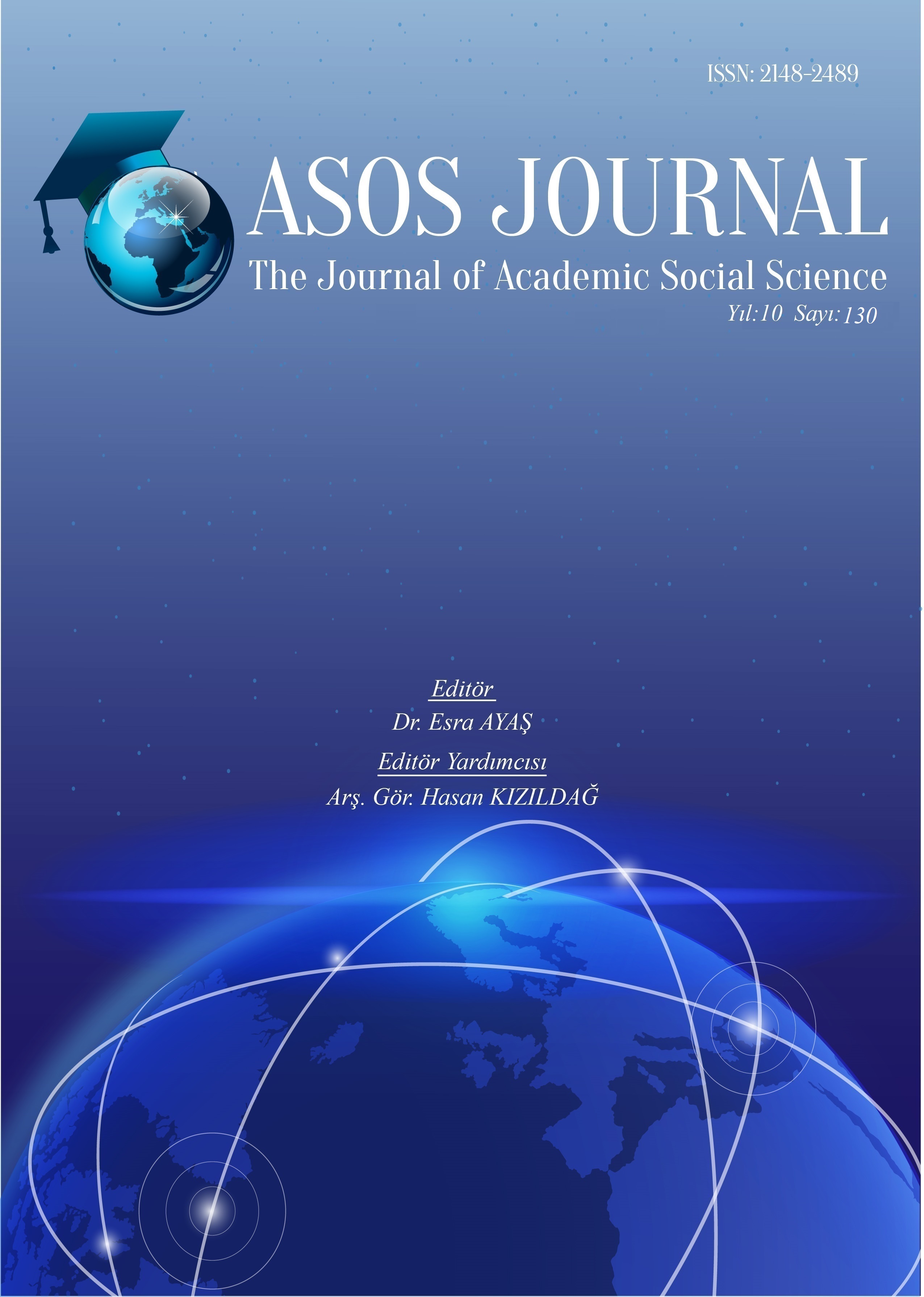Author :
Abstract
- yy’de buhar makinelerinin gelişimiyle başlayan sanayi devrimi günümüze kadar gelen süreçte önemli değişimler yaşamıştır. Günümüzde insan gücünün yerini makineler, otomasyon ve dijitalleşen iş süreçleri almıştır. Ülkelerin ve toplumların sosyal, kültürel ve ekonomik gelişmeleri açısından en büyük katkı sağlayan sanayi kuruluşlarının iyileştirilmesi için stratejiler geliştirilmesi istihdam ve performans artışına da katkı sağlamaktadır. Sanayileşmede çevresel sürdürülebilirlik için özellikle ekolojik çevreye zarar vermeme konusunda özenli projeler geliştirilmelidir. Son yıllarda üretim sistemlerinin akıllı teknolojik donanımlarla sahip teknolojilerle birlikte anılan 4.0 Endüstriyel Sanayi Devrimi (Endüstri 4.0) birçok tartışmayı da beraberinde getirmiştir. Yapay zekâ, bulut sistemi, büyük veri gibi donanımların yararlarının yanında robotlaşmanın getirdiği işsizlik, ağ güvenliği gibi sorunları da gündeme getirmiştir. Dijitalleşmenin getirdiği çevresel atıklar ciddi sorunlara neden olmaktadır. Son yıllarda hızlı teknolojik gelişmelerin olumsuz yönleri de irdelenmeye başlanmıştır. Endüstriyel alanda en büyük değişimin yaşandığı üretimde yeni bir paradigma sunan bu yeni süreçte ortaya çıkan sorunların belirlenerek çözüm yöntemleri ve modellerinin geliştirilmesi birbiriyle iletişim halinde olan sistemlerin iyileştirilmesinde katkı sağlayacaktır. Literatür incelendiğinde Endüstri 4.0’ın karanlık yönlerinin de ele alındığı gözlenmiştir. Bu araştırmaların daha fazla arttırılarak Endüstri 4.0’ın olumlu ya da karanlık yönlerinin tartışılması ve değerlendirilmesi sanayi sistemlerinin yönetilmesine ve literatüre katkı sağlayacaktır. Bu araştırmada 4.0 Endüstriyel Sanayi Devrimi’nin getirdiği yenilikler ve sorunlar ele alınarak incelenmiştir.
Keywords
Abstract
The industrial revolution which started with the development of steam engines in the 18th century, has experienced significant changes in the process that has come to the present. Today human power has been replaced by machines, automation and digitalized business processes. Developing strategies for the improvement of industrial establishments that maket he greatest contribution to the social, cultural and economic development of countries and societies also contributes to employment and performance increase. Careful projects should be developed for environmental sustainability in industrialization, especially not to harm the ecological environment. In recent years, the 4.0 Industrial Revolution (Industry 4.0), which is associated with technologies with smart technological equipment of production systems, has brought many discussions with it. In addition to the benefits of hardware such as artificial intelligence, cloud systemand big data problems such as unemployment and network security brought about by robotization have also been brought to the agenda. Environmental wastes brought by digitalization cause serious problems. In recent years, the negative aspects of rapid technological developments have begun to be examined. In this new process, which presents a new paradigm in production where the biggest change is experienced in the industrial field, the development of solution methods and models by determining the problems that arise in this new process will contribute to the improvement of systems that are in communication with each other. When the literature is examined, it has been observed that the dark aspects of indusrty 4.0 are also discussed. Discussing and evaluating the positive and dark aspects of Industry 4.0 by increasing these researches will contribute to the management of industrial systems and the literature. In this research, the innovations and problems brought by the 4.0 Industrial Revolution were examined.
Keywords
- Akben, İ. ve Avşar, İ. İ. (2018). Endüstri 4.0 ve Karanlık Üretim: Genel Bir Bakış, Türk Sosyal Bilimler Araştırmaları Dergisi, 3(1). Hasan Kalyoncu Üniversitesi.
- Alçın, S. (2016). Üretim İçin Yeni Bir İzlek: Sanayi 4.0, Journal Of Life Economics, 3(8), 19- 19.
- Aydoğmuş, H. (2021). Bir’’ şehir madeni’’: Elektronik atık, trthaber.com.
- Forti, V., Balde, P. C., Kuehr, R. ve Bel, G. (2020). The Global E-Waste Monitor: Quantities, flows and the circular economy potantial. United Nations University (UNU)/United Nations Institute for Training and Research (UNITAR) co-hosted SCYCLE Programme, International Telecommunication Union (ITU) & International Solid Waste Association (ISWA), Bonn/Geneva/Rotterdam.
- İmamoğlu, S. Z., İnce, H. ve Türkcan, H. (2021). Atatürk Üniversitesi İktisadi ve İdari Bilimler Dergisi, 35(1).
- Manda, I. M. ve Dhau, B. S. (2019). Responding To The Challenges And Opportunities In The 4thIndustrial Revolution In Developing Countries, ICEGOV2019, 3-5 April 2019, Melbourne, VIC Australia. https://doi.org/10.1145/3326365.3326398.
- Memon, R. K. ve Ooi, K. S. (2021). The Dark Side Of Industrial Revolution 4.0-Implications And Suggestions, Academy of Entrepreneurship Journal, 27(2).
- Newton, E. (2021). How Is Industry 4.0 Optimizing The Waste Industry ?, Erişim Tarihi: 12. 05. 2022. https://theiotmagazine.com/how-is-industry-4-0-optimizing-the-wasteindustry-bfd4d35770f4.
- Petekçi, R. A. (2017). Endüstri 4.0 Fırsat mı Tehlike mi? Bilgisayar Bilimleri ve Teknolojileri Dergisi, 2(1), 7-15.
- Saturno, M., Pertel, M. V., Deschamps, F., Loures, R. F. E. (2017). Proposal Of An Automation Solutions Architecture For Industry 4.0, 24th İnternational Conference On Production Research,
- Taş, H. Y. (2018). Dördüncü Sanayi Devriminin (Endüstri 4.0) Çalışma Hayatına Ve İstihdamına Muhtemel Etkileri, Uluslararası Toplum Araştırmalar Dergisi (OPUS), 9(16), https://doi.org/10.26466/opus.479123.
- thefrontierpost.com. (t.y). Electronic Waste: The Dark Side of Industry 4.0. Erişim Tarihi: 10.05.2022. https://thefrontierpost.com/electronic-waste-the-dark-side-of-industry-4-0/.
- Yasım, K. Y. (2020). Endüstri 4.0: Çalışmanın Geleceği, Kırklareli Üniversitesi İktisadi ve İdari Bilimler Fakültesi Dergisi, 9(1).





